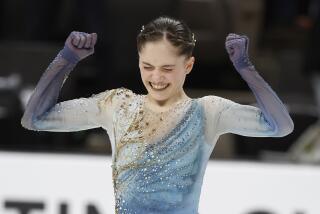Gold-Silver Finish Has Dutch Clapping
NAGANO, Japan — The best tulips, the most exquisite cut diamonds, the finest chocolate. Dutch, every one of them.
Clapskates? Those too.
While the rest of the speedskating world was plugging along on fixed-blade skates, the Dutch were experimenting with what have come to be called clapskates, which allow the skater to lift his heel while keeping the blade on the ice. That makes for a longer, more powerful glide and faster times. The name derives from the distinctive sound made as the boot heel lifts from the blade, then claps back in place.
The Dutch showed just how well they had learned to use the new skates here Sunday when they finished first, second and fourth in the men’s 1,000-meter race, a sprint. The Dutch have always been known as distance skaters.
Ids Postma, who finally kept his feet under him, won in Olympic-record time, 1 minute 10.64 seconds, followed by Jan Bos, whose 1:10.71 also beat Dan Jansen’s old Olympic mark of 1:12.43. Bronze medalist Hiroyasu Shimizu of Japan, the gold medalist in the 500, also beat the old time. So did Jakko Jan Leeuwangh, the fourth-place finisher.
In fact, in a testament to the efficiency of clapskates, their idiosyncrasies learned and mastered, the first 18 finishers broke Jansen’s four-year old record.
And so dominant were the Dutch skaters that the American contenders, who finally got onto the new skates last fall, began talking about the Salt Lake City Games in four years.
“As of last year, we were setting up in great positions in a number of races to come in here and medal, and these clapskates definitely threw us off,” said Casey FitzRandolph, who finished seventh, just ahead of teammate KC Boutiette. “There’s no doubt in my mind that we’d have had a better showing here without these skates.
“But we’re right on the bubble with these top-10 finishes. If we can be on the bubble in six months, we’ve got four years coming up before Salt Lake. I’m very encouraged by our performances. Realistically, if we’d medaled in these Games, it would have been a bonus.”
Boutiette agreed.
“We’re right on the edge of another breakthrough,” he said. “With Casey FitzRandolph, it’s too bad these skates came out because he was one of the best in the world until [then]. But he’s made a big improvement in the last two months. . . . I think this is a very young team and this was almost like a prep program for us in Salt Lake.”
A lot the Dutch cared. With Norwegian Aadne Sondral, gold medalist last Thursday in the 1,500 missing the race because of flu, they had almost clear sailing.
Postma, who fell in the first run of the 500, then finished second to Sondral in the 1,500 when he nearly fell in the last turn, skated just after Shimizu had put up an Olympic record and, with an especially strong finish, wiped it out. His final lap of 27.32 seconds was easily the fastest of the race and in winning, the defending world all-around champion gave the Netherlands its first gold medal in a sprint.
Bos, Leeuwangh, and the Canadian fliers, world-record holder Jeremy Wotherspoon, Sylvain Bouchard and Kevin Overland, all had chances to beat him, but couldn’t. Wotherspoon started well but faded and finished sixth, well off the pace at 1:11.39.
“I was really good at 600 meters and I just died,” Wotherspoon said. “That doesn’t normally happen to me.”
Pointedly ignoring equipment, Postma said of his team’s showing, “We’re very strong right now. I don’t know why it’s happening. I’m really happy with the gold. That’s what we came here for.
“I’m an all-around skater and I just prepared for the 1,000. Normally, I have a lot of speed. Today, I had a very good second lap, better than most sprinters.”
In fact, better than all of them.
More to Read
Go beyond the scoreboard
Get the latest on L.A.'s teams in the daily Sports Report newsletter.
You may occasionally receive promotional content from the Los Angeles Times.






